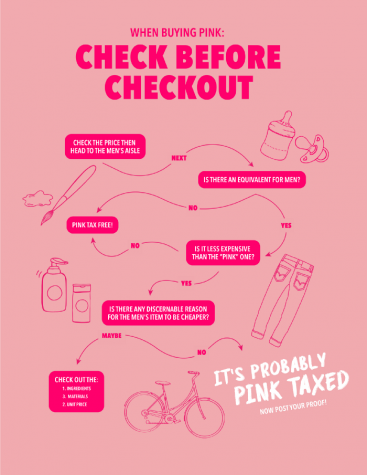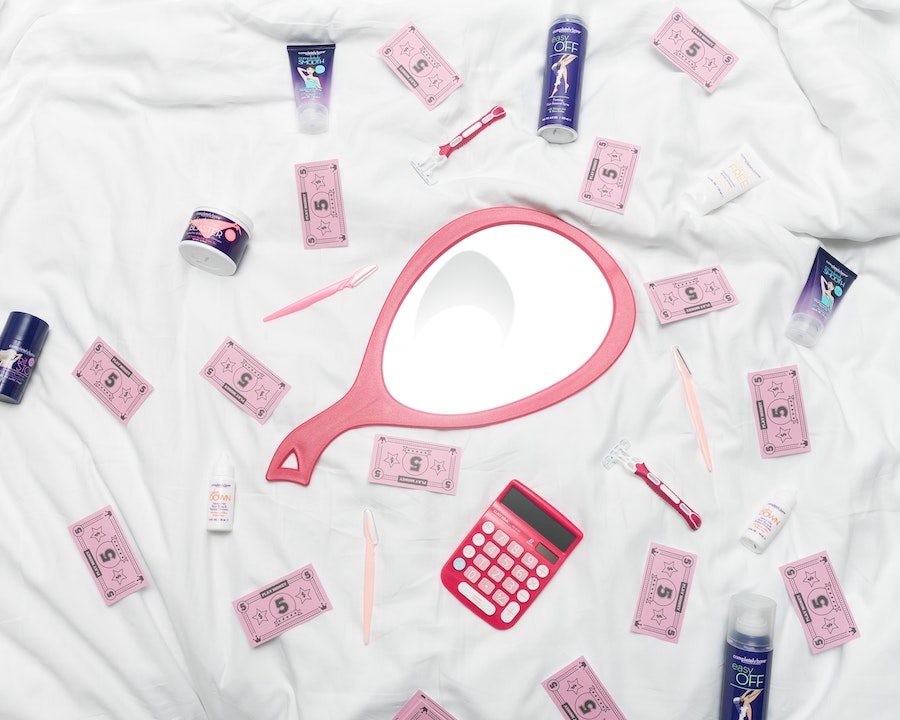The Price of Being a Woman
December 1, 2020
While shopping, have you ever noticed that women’s products cost more? There is a real reason behind it: the pink tax.
The “pink tax” is not an actual tax; rather, it is the extra money spent on feminine products. This tax affects women of all ages, starting with the toys they buy. It impacts the prices of body washes, hygiene items, clothing, dry cleaning, hair cuts, and more. There is often no difference between the products aside from the color, with the women’s as pink and the men’s as blue. The product intended for women will have a higher price. Pads and tampons have sales taxes because they are considered “luxury” items, yet they are necessities.
“I have heard of the pink tax and the tax on pads and tampons. I think that this tax is extremely unfair, as no one chooses to have a period and shouldn’t be penalized because of it. I’ve had several experiences where I realized that men’s products are less expensive. The example that stands out to me the most is that men’s razors are not only much less expensive but also more effective,” said Avery Rogan (’23).
The sales tax system from the 1930s to 1960s dictated that certain items would have a sales tax or be tax-free. This was accounting for single-income families where only the man worked. However, these tax policies have not changed over time. Since the 1990s, numerous studies have indicated the gap between services orientated towards men versus women. There are higher tariffs on clothing imports for women. More elaborate designs of women’s goods cost companies more, who then charge consumers an increased rate.
Women have paid more than men 42% of the time with about $1,300 extra spent per year. The New York City Department of Consumer Affairs conducted a study with over 800 different products and found that 7% of women’s products cost more. Women paid 7% more for toys and accessories, 4% more for children’s clothing, 8% more for adult clothing, 13% more for personal care products, and 8% more for senior/home health care products.
Hello! Thank you for contacting us, we're sorry for the trouble. We strive to maintain competitive prices on everything we carry. Please visit the following Help page for information about our price match policy: https://t.co/BQOnHHZmkX. We hope this helps! ^XM
— Amazon Help (@AmazonHelp) November 14, 2020
“I think that taxing women more for the same products is very unfair. This is especially true with products like pads and tampons because those products are necessary for women. I haven’t really bought any men’s products, but I have noticed that their products (like shoes and clothes) are made to be functional and comfortable, while women’s clothes are just made to look good and are usually pretty uncomfortable,” said Amanda Stephens (’24).
Fighting for an end to this tax is not a new development. In Kenya, the national sales tax on menstrual products was eliminated in 2004. In July 2015, Canada eliminated its national Goods and Services Tax on menstrual products as the result of a multi-decade campaign. Within the past few years, India, Malaysia, Colombia, Australia, and South Africa have eliminated the tax. The movement gained popularity in 2016 after the New York Times issued its first national editorial calling for the tax’s end.
In 2018, Democratic Representative Jackie Speier introduced the Pink Tax Repeal Act, which would prohibit the price inconsistency between products that are labeled by gender. Unfortunately, this bill failed.
In 2019, 22 states introduced bills to eliminate tampon tax, but only Rhode Island followed through. As of Nov. 2020, 30 states still have taxes on feminine hygiene products such as tampons and pads.
View this post on Instagram
The Tax Free. Period. campaign was launched in June 2019 and called for all states to end the tax by the deadline of Tax Day 2020. Supporters believe that menstrual equity includes access to safe, affordable products and information. Five states responded and ended the tax. The campaign has set a new countdown since Tax Day has been pushed back to July 15, 2021. Jennifer Weiss-Wolf, the co-founder of Tax Free. Period. wrote an opinion article titled “Periods Don’t Stop for Pandemics.”
“Periods should not be an afterthought—or worse, cause for punishment or deprivation of bodily integrity. At a minimum, governments must ensure that those doing the crucial work on the frontlines have access to basic needs,” said Weiss-Wolf.
On Sept. 30, Governor Andrew M. Cuomo of New York started a reform that would ban the tax. He believes that it is unacceptable that women should have to pay more for products, considering the many inequalities that they face each day. He hopes that eliminating this tax will help to ensure financial progress for women.
As of Nov. 24, Scotland became the first country to make sanitary products free after receiving legislature approval. In 2018, Scotland began providing free sanitary products to schools, universities, and colleges. A government program, costing about $6.4 million, supplies 395,000 students with essential sanitary products every month. Wales and England started similar programs in 2019.

From January 1, 2020, to December 31, 2021, diapers and menstrual hygiene products will be exempt from California’s sales tax. This is a significant improvement since the state has made $33.4 million a year from menstrual care products in the past.
There are many alternatives to help consumers avoid this tax. Harry’s provides low-priced, quality products, including body wash, bar soap, face care, shampoos, and razors. They set aside 1% of its sales for donations to charitable organizations that promote men’s mental health, such as Campaign Against Living Miserably (CALM) and Headstrong. Boxed is fighting the tax by enforcing price equality, and their store has no tax for tampons. The company hopes for young daughters to grow up in a world where they will not pay more just because they are women.
There has also been a rise of reusable medical-grade silicone cups such as the Lena Cup, a cost-effective and environmentally friendly alternative to tampons.

